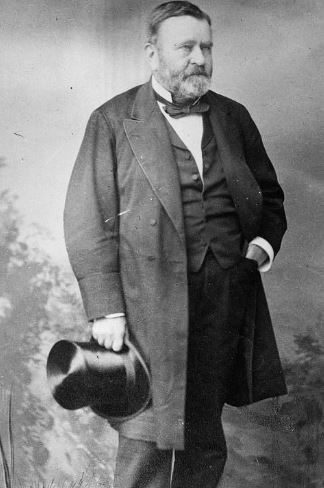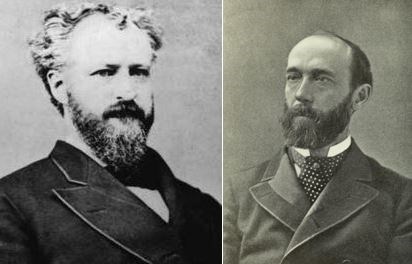Last updated: January 10, 2021
Article
Treaty of Mentor

Library of Congress
On the afternoon of Tuesday, September 28, 1880, former President Ulysses S. Grant and New York Senator Roscoe Conkling spoke to a gathering of about 40,000 people under a tent in Warren, Ohio. The meeting was notable not only for the size of the crowd, but also for the speakers. Grant had wanted the Republican nomination for a third term as President, and Roscoe Conkling was the leader of the Grant-backing Stalwarts in the party. Angry and disappointed at the results of the June 1880 Republican National Convention, neither had yet actively campaigned for the Garfield and Arthur ticket. It took considerable negotiating skill and political pressure to convince them that their active participation in the campaign was needed to insure a Republican victory.
Following the speeches in Warren, Grant, Conkling, and a party of about 15 local Republicans came to Mentor to visit the party’s candidate at his home. About 200 local supporters were introduced to the dignitaries on Garfield’s front porch. Inside, Mrs. Garfield served some light refreshments and some of the gentlemen adjourned to Garfield’s upstairs study to smoke cigars and talk politics.
Garfield recorded the visit in his diary on September 28, 1881, "The party consisted of General Grant, Senators Conkling and Logan, Congressman Morton and about fifteen gentlemen from Cleveland. Some two hundred citizens came to the house and were introduced to General Grant. C. gave them a lunch and coffee in the dining room, After remaining an hour the party were driven to the station..."

Reports of that interlude quickly took on a life of their own. Garfield recorded that “I had no private conversation with the party, but the call was a pleasant and cordial one all around.” Conkling supporters, some of whom were not even there, insisted that a deal had been struck. The agreements that they understood had been made before Grant and Conkling agreed to campaign in Ohio, were, they claimed, ratified by Garfield and Conkling that drizzly evening, in what Stalwart newspapers would call the “Treaty of Mentor.” It never happened.
If no event like that occurred, which Garfield confirms in his diary, then where did it come from? Upon further research into the "Treaty of Mentor" the name Thomas Platt appeared. Thomas Platt and Roscoe Conkling were both higher ups in the Republican Party from New York. In his autobiography Thomas Platt remarks about the conversation between Conkling and Garfield. "...exacted a pledge that in all appointments for the federal service in New York State in case of his election, Garfield would consult the United States Senators, etc. and that he would make no appointment for New York unless they were approved by these officials..." Joseph Stanley-Brown, Garfield's private secretary, even gave his view on the "treaty". "I was present during the entire period of the meeting and there was never a moment when the Conkling group were closeted with the General nor was there ever presented any opportunity for such a bargain. It was a deliberate lie."
What happened to Thomas Platt after the nomination of James A. Garfield as the 20th president? Once the two men realized that President Garfield would not seek their approval in appointments they resigned from politics completely. It wasn't until 1897 before Thomas Platt would return to politcs and become a pivotal reason as to how Theodore Roosevelt became Vice President.
The speech given by President Ulysses S. Grant while he was in Warren, Ohio before meeting with James A. Garfield. at his Mentor home can be read on the Library of Congress website.
